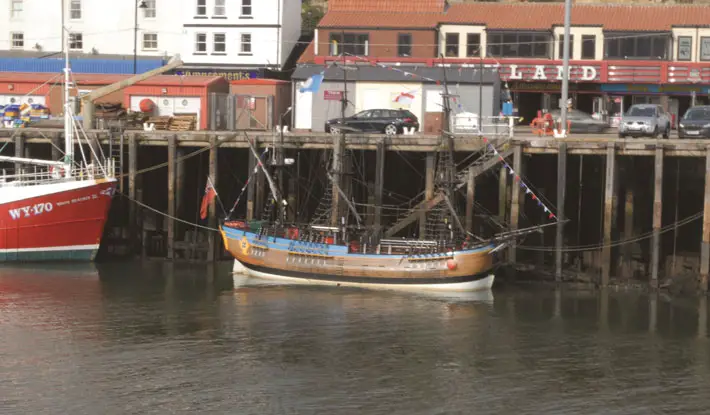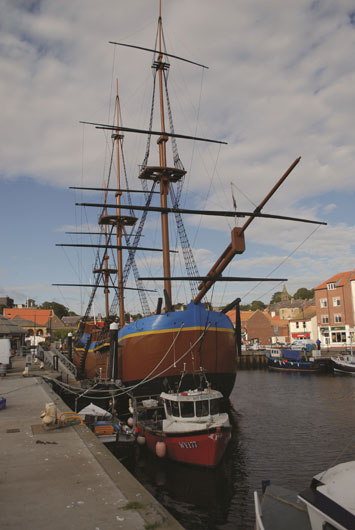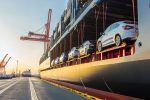Whitby and Captain Cook’s Endeavour
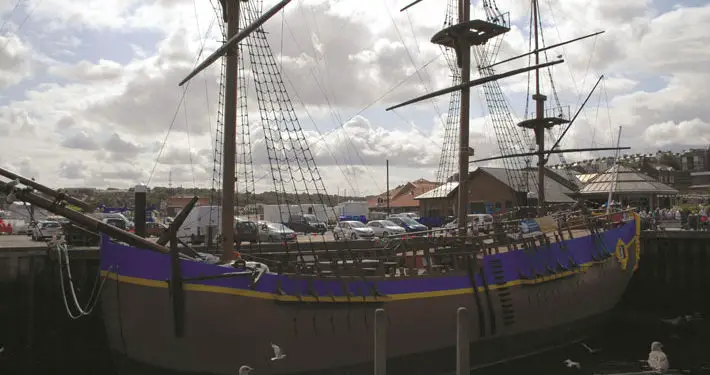
By Ian Thompson & Roger Frost
Whitby is, rightly, proud of its connections with Captain Cook’s historic ship, the Endeavour. Cook was commissioned to conduct his explorations by the Royal Navy. They needed to provide him with a ship that would be best suited to the task. Colliers, which carried coal from the north-east of England, were considered ideal as their strong construction and flat-bottomed hulls were able to navigate shallow water. The ships could be beached and re-floated, which made repairs and resupply so much easier where docks and piers did not exist.
All four of Captain Cook’s ships were Whitby-built colliers, the most famous being the Endeavour and the Resolution . The other two, Discovery and Adventure , still played vital roles, the latter being the first ship to circumnavigate the globe from west to east. The Endeavour was built in 1764 by the shipbuilder Thomas Fishburn and was named The Earl of Pembroke before being bought, for £2,840 10 shillings and 11 pence, by the Royal Navy for Cook’s first mission in 1768.
The refit required to make her suitable for her mission cost almost as much as the purchase price. The last change to be made was the name. Endeavour was already in use as a naval cutter, so the given name became His Majesty’s Bark the Endeavour. Bark related to the type of ship that the Endeavour was with her three masts.
“Refitted as naval transport”
On her voyages she sailed up the eastern coast of Australia, landing at Botany Bay before continuing onward. The Endeavour ran aground on the Great Barrier Reef and, in order to sail off the reef, it needed to be substantially lightened, so the guns and other supplies totalling around 50 tons were thrown overboard, after which substantial repairs were carried out.
The Endeavour returned to England in July 1771, putting into Dover. It was quite an unexpected return, especially when there had been much speculation about whether the ship had been lost at sea.
It was after the return that Captain Cook was about to embark on his next voyage of discovery but, alas, not with Endeavour. The ship was refitted as a naval transport and made three trips to the Falklands, the last trip being used to evacuate the Falkland Islanders in April 1774.
Later in 1774, Endeavour was decommissioned and sold for £645 to Mather & Co., a large shipping corporation. During the American War of Independence, Mather & Co. offered the Endeavour as a transport ship, but it was rejected as unfit for service. They tried again, changing its name to Lord Sandwich , but it was recognised and rejected again. A third attempt, under the imaginative name of Lord Sandwich 2, was successful.
“Lost to the sea”
Endeavour set sail for the Americas where she served for a short time as a prison ship before taking part in the attack of Newport in August 1778.
In order to prevent the French Fleet (who were allied to the Americans) from entering the harbour, the British Commander ordered several vessels to be scuttled and sunk. On 4 August 1778, Endeavour was lost to the sea.
Today the wreck has yet to be definitively identified, although there are strong indications that Endeavour has been found. Its cannons were recovered from the Great Barrier Reef in 1969, and in 1994 a replica of Endeavour was built in Australia and visited Whitby in 1997 and 2002 before returning to Australia as a museum ship.
In Whitby you are lucky enough to see two replicas of Endeavour. One is around halfsize and provides regular trips down the coast, and the other is a museum ship, which was the second full-sized replica built. This is now moored in Whitby harbour.

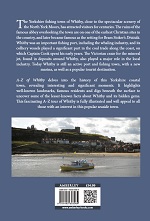 Article taken from ‘Whitby A-Z’ by Ian Thompson & Roger Frost
Article taken from ‘Whitby A-Z’ by Ian Thompson & Roger Frost
Published by Amberley Publishing, £14.99 paperback
